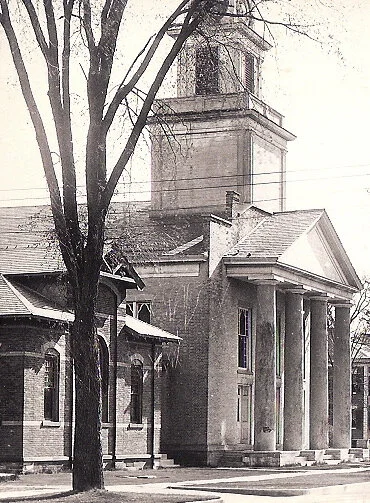The History of Fort Salem Theater
Fort Salem Theater faces out toward a broad, tree-lined street in Salem's National Historic District. The theater presides in majesty over its neighbors, which include many gracious homes dating from the early 1800's, with its tall steeple and towering white columns supporting a Greek Revival portico over white marble steps.
The history of the building is a journey in itself. In 1774, a structure for the county’s First Presbyterian Church was started – but before it was completed, patriot forces occupied what there was of the new church building and built a stockade and barracks for the troops, known as Fort Salem. It was burned in the late summer of 1777 by the opposition. The congregation rebuilt their church two more times, but both buildings were lost to fire. In the final fire, the walls were left standing and the Presbyterians rebuilt one more time "with improvements." This is the building you see today. Some charred timbers in the basement are testament to the building’s history. In 1882 a chapel was added.
In 1972 it was purchased by Judge William Drohan of New York City, a summer resident of Salem and part-time thespian of some note, who saw in the structure a myriad of unexplored possibilities. He replaced the altar with a stage, made other necessary changes, and produced the first shows at the Fort Salem Theater. In 1979, the theater was sold to Quentin C. Beaver, a director and award-winning actor. Under his guidance, the reputation of Fort Salem thrived, becoming one of the premier summer stock theatres of the Northeast, known for the professional quality of its family-oriented musicals, comedies and occasional dramas. His daughter, Kathy Beaver, served as artistic director for five seasons, through the very successful thirty-fifth anniversary summer in 2006. In the fall of 2006, Hebron resident Jay Kerr purchased Fort Salem Theater from the Beavers.
In 2006-2007, a major renovation took place. The chapel, once home to dressing rooms and a scene shop, became an elegant cabaret, with state-of-the-art lighting and sound. The Mainstage, like the cabaret designed by David Pedimonte, was totally renovated, with a proscenium arch and new stage, beautifully executed by Jewett Restorations of Saratoga Springs. Some of the church’s original wooden pews remain on premises, but the nineteenth century theatre seating has been replaced with seats donated from and by Broadway’s Helen Hayes Theater.
As of 2020, the Fort Salem Theater is under new ownership, and in June 2021 the theater reopened with a sold-out run of The Marvelous Wonderettes. Check back soon for updates!

